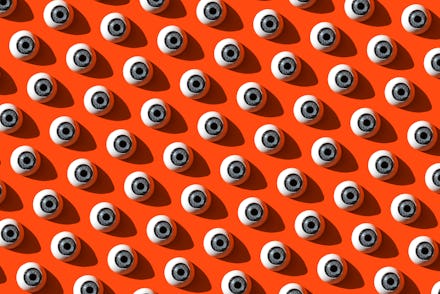The pandemic has been hell for our eyes. Here's how you can do some damage control

The pandemic is wreaking havoc on our bodies and minds and, it turns out, even the windows to our souls. The pandemic has likely increased the amount of time we spend staring at screens, leading to what some are calling, “lockdown eye strain.” And while Zoom and social media have helped many of us survive this lonely ride on the coronacoaster, the increased eye strain created by all this screen time is really uncomfortable, so I started doing some research on what should help stop the damage. After contemplating some pretty woo-woo suggestions for eye exercises, I consulted some doctors about what we can do to soothe our Zoom exhausted eyes.
Many of the experts I spoke with said that it’s not just the time we spend staring at screens that’s causing our eye issues, it’s the way that we stare at them. “Whenever we are on our devices, we forget to blink,” Yuna Rapoport, an NYC-based ophthalmologist and professor of ophthalmology at Icahn School of Medicine at Mount Sinai, tells me. Blinking lubricates the eyes, so not blinking causes the cornea of the eyes — the outermost lens — to dry out, Rapoport says. Dryness in the cornea can lead to all kinds of problems, including burning, itching, tearing, a feeling of pressure behind the eyes, and contact lens intolerance. Staring at screens could also lead to a condition some opthamologists are calling “computer vision syndrome.”
Okay, but if one of the reasons all this happens is that we’re not blinking enough, how can we even tell? How often do we need to blink? “We typically blink our eyes once every three to four seconds, or approximately 20 times per minute,” says Selina McGee, an optometric physician in Oklahoma. When we look at a screen our normal blink rate of 20 blinks per minute can fall to as low as 7 blinks, explains McGee. That’s almost a third less blinking and therefore a lot less moisture to lubricate the eyes.
The thing is that you may not notice this reduction in blinks, so if you spend a lot of time on screens, both McGee and Rapoport both recommend keeping eye drops. Humidifiers are also an option, and McGee says it helps not to have fans blowing air on you when you’re at your screen.
Another problem is that when you spend a lot of time on screens, you are staring at something very close to you for long periods of time. That may seem obvious, but it’s not natural for humans. Think about it: When you’re walking around in the world — remember when that was a thing? — your eyes move a lot in many directions, which means that they don’t have to focus in the same place all the time. Think about it this way: If you keep any part of your body in one position too long, it gets fatigued, and quite frankly, overworked.
Rapoport and Mcgee both mentioned following what they call the 20-20-20 rule. “Every 20 minutes, look 20 feet away for 20 seconds,” says Rapoport. This will help you prevent overworking the same eye muscles all the time. Making sure you follow the 20-20-20 rule has the added benefit of reminding you to take movement breaks from screen time, something we all need more of. To reduce straining the same tiny eye muscles repeatedly, McGee recommends positioning your screen at eye level about an arm’s length from your body.
So back to those eye exercises. Our eyes do need to move right? When I was in yoga instructor training, my teacher recommended a practice called Netra Viyamam, which is a series of asanas for the eyes. Unfortunately, the experts I spoke with said they won’t help with the dryness issue. “Eye exercises will not help combat these symptoms unfortunately because the discomfort comes from damage to the cornea,” Rapoport explains.
Other experts also told me that eye exercises can’t claim to have any clinical efficacy, but I’m here to report anecdotally that eye yoga is lovely— like stretching for your eyeballs — and experts say it won’t hurt you, so I’m sticking with it. Eye yoga may not be science, but it feels good and right about now anything that brings pleasure and doesn’t hurt anyone is going on my list of ways to feel okay right now.
Some researchers think the eye strain situation is so bad that it represents a significant threat to public health. I’m not willing to go as far as calling eye strain an epidemic, but it’s worth it to keep your peepers lubed and toned right along with the rest of your meat suit. So what else can you do?“Stay hydrated!” says Mcgee, “Drinking water really does help with eye dryness.” And Rapoport says if your eyes do feel stressed, try using a warm compress on them at night before you go to bed. That sounds cozy af and like it will pair really well with a bedtime story.